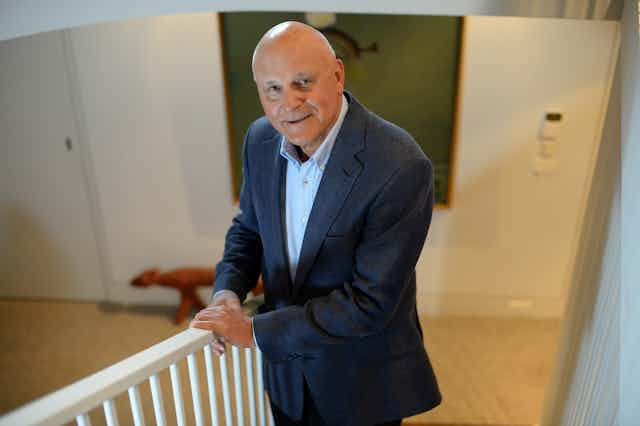We see their spokespeople quoted in the papers and their ads on TV, but beyond that we know very little about how Australia’s lobby groups get what they want. This series shines a light on the strategies, political alignment and policy platforms of eight lobby groups that can influence this election.
Formed in the mid-1960s, the Australian Conservation Foundation (ACF) is one of Australia’s longest-running and most influential environmental lobby groups. The non-profit membership organisation campaigns against pollution and mining, and advocates for clean energy and strong environmental laws.
The ACF’s major focus this election is shaping up to be the Great Barrier Reef. The recent, catastrophic bleaching event has thrust the Great Barrier Reef front and centre into the election debate, and the ACF is putting pressure on all major political parties to address this issue.
It seems this pressure is working. Prime Minister Malcolm Turnbull this week announced a A$1 billion commitment for the Great Barrier Reef; although the ACF has criticised the lack of reference to climate change in this announcement.
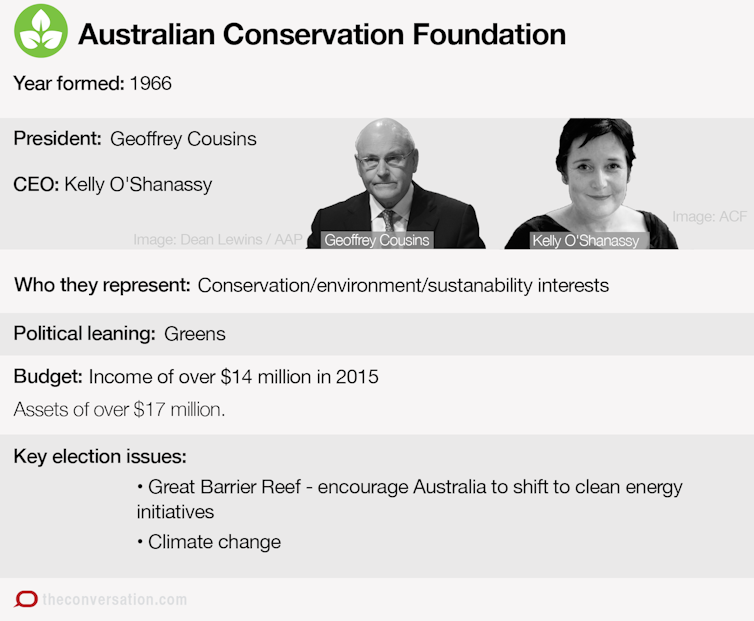
ACF membership costs A$10 and those who join are encouraged to give additional contributions. Almost 90% of the ACF’s income derives from donations and bequests. It also receives a small amount of funding from federal and state government, and a modest amount from membership fees.
While the ACF does not explicitly align itself with any particular political party, the greener a party’s credentials, the higher it ranks in the ACF’s estimation.
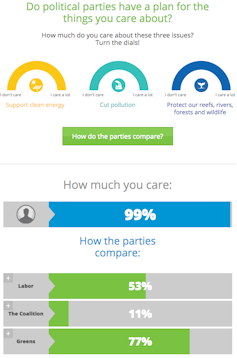
The ACF’s Environmental Scorecard ranks the three major parties on their environmental credentials. The Greens leads the way with a 77% score. Labor is on 53%, and the Coalition on only 11%.
The ACF has also endorsed the Greens’ climate change policies. But it hasn’t explicitly suggested that people vote for them.
The ACF has made some progress through collaboration with the private sector. Since 2004, it has been part of the Australian Climate Roundtable (previously the Australian Business Roundtable on Climate Change). This unlikely coalition includes the Australian Aluminium Council, Australian Industry Group, Business Council of Australia, and Energy Supply Association of Australia. The coalition has agreed to a set of principles underpinned by an agreement to try and meet the Paris Agreement’s 2°C target.
This approach of working with businesses, rather than against them, has arguably been one of the reasons for the ACF’s success.
The ACF also has a strong history of working with other environmental groups. The Places You Love Alliance brings together the ACF with other groups including the Wilderness Society and WWF, to campaign for stronger environmental laws.
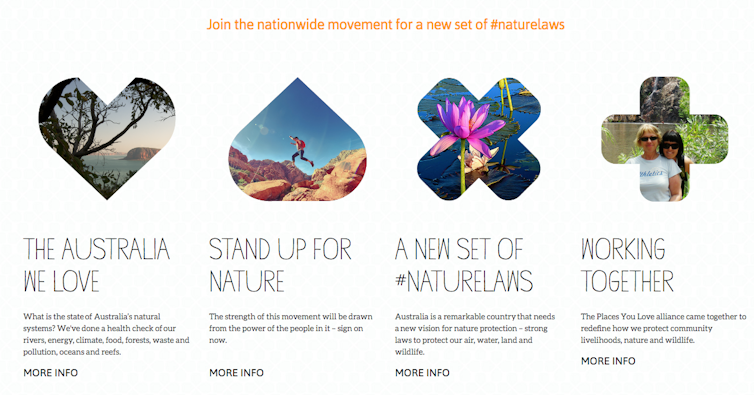
In recent years, the ACF has retreated from an “insider” approach of lobbying politicians for policy change, towards a more grassroots approach, harnessing community support. This is the basis for the ACF’s drive to put the Great Barrier Reef on the election agenda through amassing public support, rather than lobbying parties directly.
The ACF’s approach is more conservative than some other more radical environmental groups, which may be another reason for its success.
Much of the ACF’s success in achieving environmental objectives over the decades has occurred before the courts. In the late 1970s through the 1980s, the ACF launched several high-profile challenges to development on environmental grounds.
In 1980, the [High Court of Australia prohibited the ACF](http://www.austlii.edu.au/cgi-bin/sinodisp/au/cases/cth/high_ct/146clr493.html?stem=0&synonyms=0&query=title%20(%20%22%201980%20146%20clr%20493%22%20) from challenging a decision about a new resort in central Queensland. The High Court stated that “a belief, however strongly felt, that the law generally, or a particular law, should be observed” does not allow a group to challenge a decision.
Despite this setback, tenacity paid off. In a 1989 case, the ACF challenged a decision to grant licences for the export of woodchips. The Federal Court found the ACF had a “special interest” in the subject matter, permitting it to challenge the decision. This case famously extended the ability of public interest groups to challenge decisions made by government.
Even today, the “ACF cases” are still referred to as the basis for standing when a group seeks to challenge a decision.
More recently, the ACF challenged the original Carmichael Mine approval under the EPBC Act. This challenge never made it to final judgment before the Federal Court, as Environment Minister Greg Hunt conceded an error in the decision-making process.
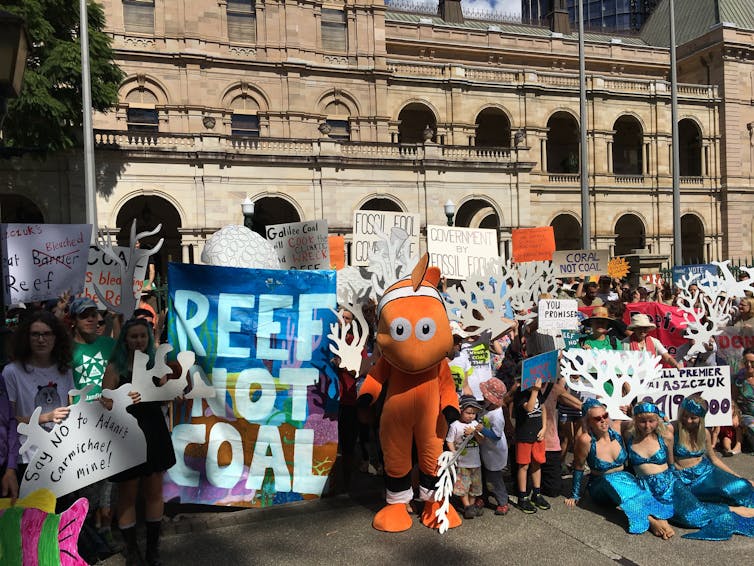
This concession sparked the so-called “lawfare” saga when the then Attorney General George Brandis launched an offensive against the rights of environmental groups to engage in “lawfare”. He described this as litigation brought by groups that:
have no legitimate interest other than to prosecute a political vendetta against development and bring massive developments … to a standstill.
Following Hunt’s concession, the decision was set aside, and a new approval for the Carmichael mine was granted in October 2015. The ACF has since launched a challenge to this revised decision, which was heard by the Federal Court in May. The decision is pending.
The ACF has campaigned hard for strong action on climate change, throwing its weight behind a carbon price in the past. The short-lived carbon price introduced by the Gillard government is counted as one of the ACF’s successes.
But interestingly, a carbon price hasn’t featured as prominently in the ACF’s election campaign lobbying in 2016.
Read the other articles in The Conversation’s Australian lobby groups series here.

